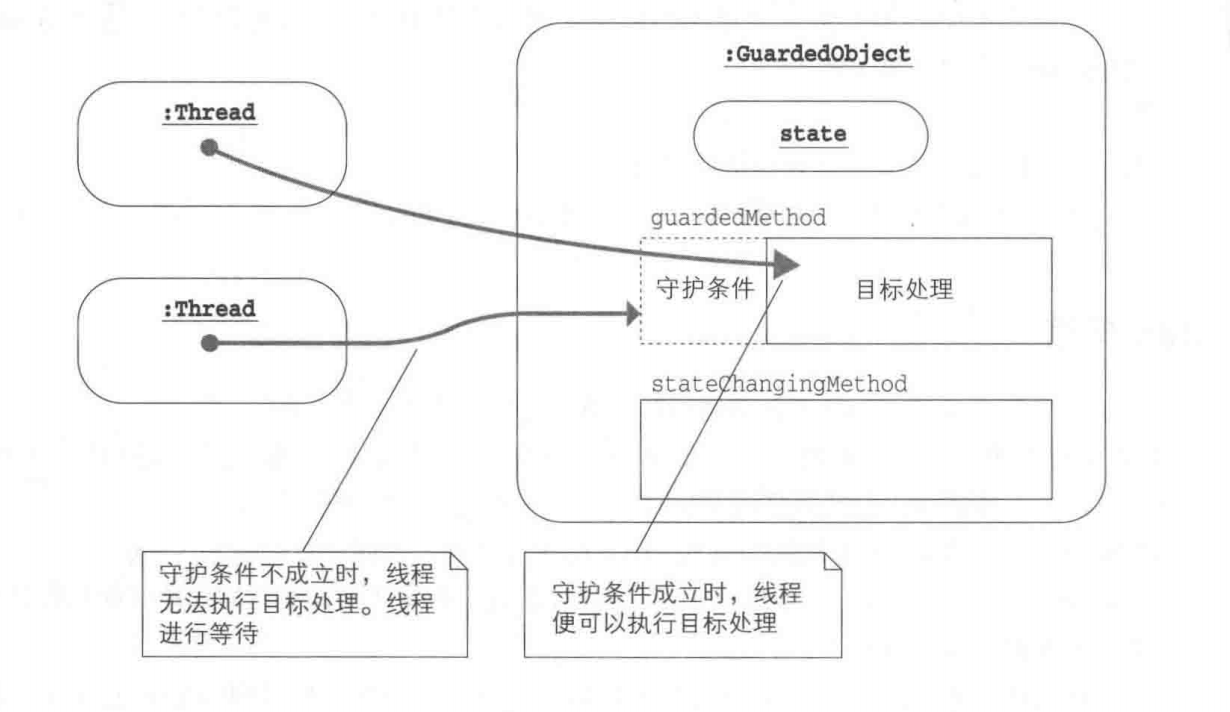Guarded Suspension模式思想就是:如果执行现在的处理会造成问题,那就让执行处理的线程进行等待。Guarded Suspension模式通过让线程等待来保护实例的安全性。就像你没穿衣服,让快递员在门口等你一会儿来保护你的隐私一样。
也就是说,该模式存在一个持有状态的对象,该对象只有在自身状态合适时,才会允许线程进行目标处理。
在Single Threaded Execution模式中,只要有一个线程进入临界区,其他线程就无法进入,只能等待。而在Guarded Suspension模式中,线程是否等待取决于守护条件。后者是在前者基础上添加了附加条件而形成的。
Guarded Suspension模式
GuardedObject(被守护的对象)
GuardedObject角色是一个持有被守护方法的类。当线程执行该守护方法guardedMethod时,如守护条件成立,则可以立即执行;否则就需进行等待。
守护条件的成立与否会跟随GuardedObject角色的状态不同而发生变化。
除了guardedMethod之外,GuardedObject角色还有可能持有其他改变实例状态的方法stateChangingMethod,特别是改变守护条件。
在Java中,可以使用while语句和wait方法来实现守护方法guardedMethod,而改变实例状态的方法stateChangingMethod可以通过notify/notifyAll来实现。

案例
案例中的RequestQueue类扮演GuardedObject守护角色,getRequest方法就是guardedMethod守护方法,putRequest方法就是stateChangingMethod改变实例状态的方法。
- Main:
一个线程ClientThread将请求Request的实例传递给另一个线程ServerThread。1
2
3
4
5public static void main(String[] args) {
RequestQueue requestQueue = new RequestQueue();
new ClientThread(requestQueue, "大泡泡", 2020).start();
new ServerThread(requestQueue, "Bubble", 2020).start();
}
输出:
1 | 大泡泡请求:[Request: No.0] |
Request:
1
2
3
4
5
6
7
8
9
10
11
12
13
14
15
16
17
18
19
20
21
22
23/**
* 表示一个请求的类
*
* @author wugang
* date: 2020-08-17 18:25
**/
public class Request {
private final String name;
public Request(String name) {
this.name = name;
}
public String getName() {
return name;
}
public String toString() {
return "[Request: " + name + "]";
}
}RequestQueue:
1
2
3
4
5
6
7
8
9
10
11
12
13
14
15
16
17
18
19
20
21
22
23
24
25
26
27
28
29
30
31
32
33
34
35
36
37
38
39
40
41
42
43
44
45
46
47
48
49
50/**
* 请求存放队列
*
* @author wugang
* date: 2020-08-17 18:25
**/
public class RequestQueue {
/**
* FIFO队列,存放请求。
* 下面的get和put方法都是用了Synchronized来保护queue字段(LinkedList的实例),
* 保证它是SingleThreadedExecution模式的即getRequest()中的两个处理(前置条件和目标处理)必须同时由一个线程来执行。
* - 判断queue中是痘存在可取的元素;
* - 从queue中取出一个元素
*/
private final Queue<Request> queue = new LinkedList<>();
/**
* 取出并返回最先存放的那个请求。
* 如队列为空,就一直等待,直到唤醒。
*
* @return 最先存放的那个请求
*/
public synchronized Request getRequest() {
// 如队列存在元素,就会返回头元素(不删除);如为空,则返回null
// 也就是Guarded Suspension模式中的守护条件,即目前进行处理的前置条件
while (queue.peek() == null) {
try {
// 线程要执行某个实例的wait方法时,线程必须获取该实例的锁。
// wait方法被调用时,获取的时this的锁。
// 执行this的wait方法后,线程进入this的等待队列,并释放持有的this锁。
// notify、notifyAll或interrupt会让线程退出等待队列,但在实际地继续执行处理之前,还必须再获取this的锁。
wait();
} catch (InterruptedException ignored) {
}
}
// 移除队列中的第一个元素并返回,如队列为空则抛出NoSuchElementException
return queue.remove();
}
/**
* 添加一个请求到队列
*
* @param request 请求
*/
public synchronized void putRequest(Request request) {
queue.offer(request);
notifyAll();
}
}ClientThread:
1
2
3
4
5
6
7
8
9
10
11
12
13
14
15
16
17
18
19
20
21
22
23
24
25
26
27
28
29
30/**
* 发送请求的类:将请求加入到队列中
*
* @author wugang
* date: 2020-08-17 18:25
**/
public class ClientThread extends Thread {
private final Random random;
private final RequestQueue queue;
public ClientThread(RequestQueue queue, String name, long seed) {
super(name);
this.queue = queue;
this.random = new Random(seed);
}
public void run() {
for (int i = 0; i < 10000; i++) {
Request request = new Request("No." + i);
System.out.println(Thread.currentThread().getName() + "请求:" + request);
queue.putRequest(request);
try {
TimeUnit.MILLISECONDS.sleep(random.nextInt(1000));
} catch (InterruptedException ignore) {
}
}
}
}ServerThread:
1
2
3
4
5
6
7
8
9
10
11
12
13
14
15
16
17
18
19
20
21
22
23
24
25
26
27
28
29/**
* 接收请求的类
*
* @author wugang
* date: 2020-08-17 18:26
**/
public class ServerThread extends Thread {
private final Random random;
private final RequestQueue queue;
public ServerThread(RequestQueue queue, String name, long seed) {
super(name);
this.queue = queue;
this.random = new Random(seed);
}
public void run() {
for (int i = 0; i < 10000; i++) {
Request request = queue.getRequest();
System.out.println(Thread.currentThread().getName() + "处理:" + request);
try {
TimeUnit.MILLISECONDS.sleep(random.nextInt(1000));
} catch (InterruptedException ignore) {
}
}
}
}
扩展
guarded wait和busy wait
guarded wait
guarded wait是被守护而等待的意思。
- 实现方法为:
线程使用wait进行等待,被notify或notifyAll后,再次检查条件是否成立。
由于线程在使用wait进行等待期间,是待在等待队列中停止执行的,所以不会浪费Java虚拟机的处理时间。
1 | // 等待端 |
busy wait
busy wait是忙于等待的意思。
- 实现方法:
线程不使用wait进行等待,而是执行yield方法(尽可能将优先级让给其他线程)的同时检查守护条件。
由于等待端的线程也是持续运行的,所以浪费Java虚拟机的时间。
wait是Object类的final方法,而yield是Thread类的静态本地方法。





